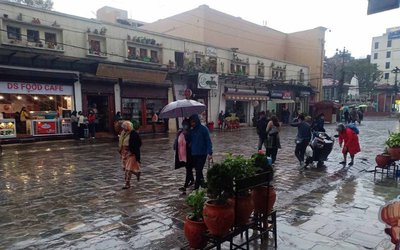Despite abundant of water resources, Nepal is yet to make the drinking water supply within an easy access of all. Although Nepal has made a steady progress to increase the access to pure drinking water and is getting closer to meet the Millennium Development Goals, there is still a big gap in the process. Even a large number of poor people, living in the urban areas, are suffering from the inadequate supply of water. As the government has been making every effort to increase the access, it is still inadequate. In this context, there is the need to increase the public-private partnership in the water sector. Although the private sector’s involvement in water supply is gradually increasing, it needs to increase at a much higher volume than the present one. In the changing global context, water is no longer a free commodity. It incurs a cost. People who can afford it need to pay. The urban poor and rural poor need the government protections.
The first and foremost priority of this government is to hold the elections. But, I always take the issues like drinking water should be the priority of the government. In this context, I decided to address the Water Week. Water is scarce and its availability is shrinking. Along with drinking, there is also lack of water for irrigation purposes. In this context, celebrating the world water day is a matter of great importance for us. There are three most important components we need to consider while looking at water management. First of all, we need to follow the integrated water management agenda. At a time when there is a growing concern on how to integrate the water issues, we have split the Ministry of Water Resources into Energy and Irrigation. So if possible, there is the need to go for integration of the water related institutions.
Another important issue is protection of water spring and water sources. Over 80 percent of our projects are related to water use intervention. The time has come for us to concentrate on protection of water spring. Due to implications of climate change, snow is melting fast. Not only in Nepal, this is creating problems in the region as a whole. We also need to focus on the protection of Himalayas. Our challenge is now how to protect water spouts and river springs.
Another of our challenges is water distribution and sharing. As Nepal is heading towards the federal states, we need to focus on the question of water use. The questions of water use, sharing and water rights are very much interlinked. At a time when there is multi-use of water, our priority is in the consumption of water. Of course, water is important for drinking. It is also one of the important components for irrigation. We need to think about water for irrigation as well. Along with the investment in drinking water, there is also the need to invest more money for the use of water in the irrigation sector. We need to have some sort of balance here. In this context, we need to look at water in the long term perspective. Compared to urban areas, the cost of water supply and water management is very much cheaper. This is the reason we have been spending a lot of money in urban water management. Due to scarcity of water, rural people have been suffering a lot. Urban dwellers too are facing problems particularly, the urban poor. A few years ago, hundreds of people died in mid-western region due to the supply of contaminated water.
Another important component is technology. There is also the need to change our mindset in accordance with the present reality. Unlike in the past, water is no longer free now. We have to think it in terms of resource mobilization. We need to think about the role of private sector and NGOs/ INGOs. Due to scarcity, people living in Kathmandu valley are now gradually understanding the value of water. We cannot afford it as a free commodity, but as a commercially viable entity. I don' think the government alone will be able to supply drinking water to all. There is the need of public-private partnership to increase the access to water for all.
(Excerpts of the statement delivered at the World Water Week)















